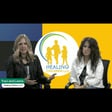Become a Creator today!Start creating today - Share your story with the world!
Start for free
00:00:00
00:00:01

Episode Seven: Childhood Trauma Series - How to Keep Calm and Parent On!
Being a parent can cause us to re-evaluate our own childhood experiences. Because I grew up in a household where emotional neglect and physical/mental abuse were normalized, I find myself triggered at times when raising a son with oppositional defiance disorder.
But we can break the cycle. Dr. Roseann Capanna-Hodge, an Integrative and Pediatric Mental Health Expert, provides insight on staying regulated and calm even during the most stressful and triggering times as a parent.
Transcript
Introduction to Guardians of Hope
00:00:16
Speaker
Welcome to the Guardians of Hope podcast, where we bring together parents, nonprofits, and legal experts dedicated to positively impacting children's lives. I'm Cynthia, your host. Before we begin, it's important to note this content should not be used as legal or medical advice. The purpose of this podcast is to inform and unite. So please seek advice from your attorney or your doctor to address your specific needs.
00:00:43
Speaker
The thoughts and opinions of my guests are not necessarily my own. This is a platform for sharing. Happy New Year, everyone.
Focus on Trauma and Parenting
00:00:52
Speaker
2024, I've decided to focus my next few episodes on trauma and parenting because I'm going through my own healing journey. Childhood trauma, whether it's psychological, physical, or sexual, has a long-term impact.
00:01:08
Speaker
It rearranges our brains, lowers our self-esteem, complicates relationships, it resides in our bodies, sometimes prompting medical and somatic concerns. Despite efforts to heal from trauma, the intense nature of parenting may highlight remaining scars.
Meet Dr. Roseanne: Transforming Children's Mental Health
00:01:26
Speaker
My first guest on the trauma series is Dr. Roseanne Kapanahaj.
00:01:32
Speaker
Dr. Roseanne is a trailblazer in mental health, a media figure, and the founder of Neurotastic Brain Formulas and the Global Institute of Children's Mental Health. She is on a mission to change the way we view and treat children's mental health and is known for her teachings on promoting brain calmness using science-driven solutions. Dr. Roseanne, thank you so much for joining me.
00:01:58
Speaker
Cynthia, I'm so excited and grateful to have this conversation because we're all parents. We didn't get a license to do it. And we all need quick, effective solutions that can help us be more connected parents to help our kids thrive. Exactly. So I really appreciate you being here and talking about how parenting can trigger childhood trauma for adults.
00:02:26
Speaker
and the benefits of co-regulation. So let's dive right
How Parenting Triggers Childhood Trauma
00:02:29
Speaker
in. Why don't you tell us about your experience and your work on kids' mental health solutions? Well, you know, this is actually my third decade in supporting kids and families. And I love working with kids and families because no matter what's going on, you know, kids don't know they can't get better.
00:02:52
Speaker
They believe, you know, when we provide a secure, loving environment, you know, they'll trust in adults in healing and they don't know they can't get better. And I just fell in love with kids 30 years ago because of that.
00:03:08
Speaker
And today, everyone always asks me, Cynthia, what has happened in these three decades? And I can tell you, other than the rise of autism, which has been pretty extreme, the other component that I see a lot of is just stress and anxiety.
00:03:26
Speaker
And, you know, people struggle, you know, for so many different reasons, like, you know, just because of everyday stressors, because of trauma, because of organic issues, because of situational stressors, they may be ignoring. And the kind of hum of the world is, I am very stressed and I don't know what to do about it. Right. Thirty years and a lot has changed.
00:03:56
Speaker
What are some ways, we're focusing on childhood trauma here, right? What are some ways parents can be triggered just by parenting day to day?
00:04:09
Speaker
You know, I think we've just broadened our understanding of what trauma is so much, right? You know, even when I was trained, you know, three decades ago, you know, when we thought of trauma, we thought of what we call big T's, right? There are little T's and big T's and big T's in trauma means big traumas, right? You know, physical, sexual abuse,
00:04:34
Speaker
you know, long-term traumas, big, huge events. And we're starting to understand that there are little teas, that there are traumas that are smaller, right? You know, a medical trauma or grief and a variety of other things that I'm missing and just because I didn't say it. But we
00:04:53
Speaker
our nervous system activates because of these traumas, right? So when we have kids, right, we all think we're like, getting this kid, they're going to be easy to parent, you know, maybe you've dealt with your stressors and traumas, and we get a kid who's challenging because 50% of the time, according to current research, you're going to have a child, 54.2% of the time, you're going to have a child that has a physical
00:05:21
Speaker
or a mental health issue and nobody is prepared. Even people like myself who have a degree and I'm a special needs mom times two.
00:05:32
Speaker
You're not really prepared for a kid that maybe is struggling with self-regulation. So when you ask the question, how can parenting trigger your stuff, as I like to say, your trauma, it's very easy. And especially when you have a kid who maybe struggles with listening,
00:05:53
Speaker
is behaviorally dysregulated, maybe even has personality, you know, features of, because I hear this all the time, Cynthia, personality features of an abusive parent, a grandparent, right? Because we inherit our personality. And so we can get easily triggered, especially when we have not properly addressed
00:06:20
Speaker
Our own history of trauma it will show up because you get activated at a subconscious level when those behaviors that you see.
00:06:32
Speaker
trigger you. And it's very easy to have happen. It's also something that can be addressed. So I don't want people to feel like, wow, I'm getting activated. There's nothing I can do about it. That's not true. It really requires very intentful, purposeful work to help your nervous system regulate and so that you can be a better parent.
00:06:58
Speaker
Got it.
The Power of Co-regulation
00:06:59
Speaker
So why don't we talk a little bit about co-regulation? Why don't you tell us what it is and how it benefits raising children? Yeah. So I love to talk about co-regulation because it is one of the most impactful things that a parent can do when they have a trauma history. It's also something that can increase
00:07:23
Speaker
incredibly quickly impact your child's behavior in a negative or positive way. So co-regulation is really what I like to call sharing your calm. So how we are regulating in our bodies, in our behavior, and in our behavior is body language, it's voice tone, it's the way our eyes are looking, it's whether we're smiling or not smiling.
00:07:50
Speaker
And it is the words we say. So how are we showing up to our children? Are we dysregulated ourselves, which can happen some of the times and is perfectly normal, but if that is your go-to behavior, that is a problem. So are we sharing our calm? Or are we sharing anxiety? Are we sharing anger?
00:08:12
Speaker
our children, their brain body behavior will regulate off of us. So if we are calm, then that is the kind of behavior our children are much more likely to reflect. And know that when you have a child with a clinical issue, right, maybe they have ADHD, maybe they have a mood disorder, maybe they have their own trauma, maybe you experience trauma together, they're going to be harder to regulate.
00:08:41
Speaker
But we know through a lot of research that co-regulation, being calm, in all of those different points of our own behavior can have an incredibly positive effect, not just on your child, but on yourself. Because when we're just regulated, boy, we feel shameful, we feel guilty, we feel embarrassed. And when we work towards self-regulation, it's one of those strategies that can really help counter
00:09:08
Speaker
Any childhood trauma that you have and in the stress of parenting in general This is great information. Can you give me some examples of how we can stay regulated? During stressful times like I know I've been in situations where I'm driving in the car and I'm stuck in traffic or someone cut me off and I get you know instant You know instantly my anxiety is up or I'm angry so I
00:09:38
Speaker
help me out and help me with some examples of staying regulated. Yeah.
Staying Regulated: Tips for Parents
00:09:45
Speaker
And you know, first of all, I believe in imperfect parenting, right? So nobody's perfect. I'm not even perfect. I always joke there's a video of me having a meltdown in the middle of BJs because there is. So, you know,
00:09:59
Speaker
How normal is it for you to swear or yell or get visibly frustrated in the car when somebody does something? I mean, yesterday, somebody, you know, literally, I don't know if they were drunk driving, you know, cut me off and I was startled and we get startled. And if you have a trauma background, your nervous system is going to startle more. So because we are imperfect,
00:10:23
Speaker
We need to share that imperfection with our kids and be like, oh, you know, if you have a younger child, you can be like, Mommy didn't handle that the best she could have. What else could I have done? You know, like let your kids in on your metacognitive thinking. Don't just spin in your head. Have conversations with your kids.
00:10:45
Speaker
acknowledge you made a mistake, right? One of the things that we're so traumatized, we're like afraid to apologize to our kids, we're afraid to let our kids know that we're not perfect, but that is a way to show them that you make mistakes, you're thinking about different solutions, because, you know, they're watching everything you do. So even if you said, oh, I shouldn't have done that,
00:11:12
Speaker
You know, no, you want to be like, oh, mommy made a mistake. I wonder what else I could have done. You know, you'll be surprised. I mean, I do this with my teenagers.
00:11:23
Speaker
and they've been so trained in this, and these are not one-off conversations. These are conversations that have happened over time, and it's so beneficial for you. It takes you out of that worry train, that stress train mode, and it's just so beneficial for your kids because our job as parents is really to create independent beings, and we want our kids to be good decision makers when we're not around.
00:11:51
Speaker
and it's a process that happens. So take that outward metacognitive problem that you're really inward and making an outward metacognitive process that you and your child can benefit from. Okay. Now, what if there is a parent who's having a lot of trouble or difficulty staying regulated? What can they do? What should they do? What resources are out there for them?
00:12:19
Speaker
Yeah, and you know, everyone is always going to say that if you are dysregulated and that is your go-to response, of course you need professional help. And if you have a trauma background, you need to go to a trauma therapist. You know, going to a therapist who is not trained in trauma is kind of a waste of your time.
00:12:39
Speaker
They're not going to understand the activation of the nervous system. So I always want to say that. But that is not the only answer. And there is no quick fix, right? So when your nervous system is activated, the solution that you really have control over is you need to do things every day at a minimum of 10 minutes. And I would say with a trauma background,
00:13:03
Speaker
I would want to see you do that at least three times a day, so 30 minutes or more. You want to have active practices that come and regulate your nervous system, right? If you're in a constant fight, flight, or freeze, your autonomic nervous system which manages your stress response,
00:13:21
Speaker
If it's going from a calm parasympathetic state to a sympathetic dominant state, and at the top is fight, flight, or freeze, which many trauma sufferers experience, if you're living up there, you've got to get out of that. And a pill isn't going to fix that. What you need to do is walk it down through regular practices, right? And do therapeutic work to stop this, you know, whatever is causing that activation, you have to get to it and put it in a safe place, right? That's what therapy is about.
00:13:51
Speaker
So, what are those strategies that you can do? There is a list of science-backed strategies that are natural and safe that people can do, right? So, you know, the first is breath work, and it can be hard for somebody who's activated to do breath works.
00:14:09
Speaker
But to do diaphragmatic breathing, right, you know, types of breaths or a box breath or a four, seven, eight breath, you're the quickest way to calm your autonomic nervous system. There's nothing quicker you can do. There isn't a pill that's going to work as fast as that. So doing breath work, meditation, mindfulness based practices, you know, mindful walks.
00:14:33
Speaker
yoga, other brain-based tools like biofeedback, neurofeedback, PEMF. These are all tools that are proven to pull you out of that sympathetic state. And in order to stay in a relaxed parasympathetic state, it doesn't matter if you have trauma or not.
00:14:54
Speaker
You've got to lubricate that. That's something you have to do. You can't lose 40 pounds and then stop going to the gym and think you're going to maintain that weight loss and the muscle gain. You've got to keep going. And I think that's the missing part in all mental health.
00:15:10
Speaker
is people don't realize how much stress we have in our world and how much we need to incorporate these practices in our daily life, which can feel very overwhelming when you're dysregulated. But when you start small and you start chipping away, you know, this didn't happen overnight, you're going to really start to see that, wow, I'm less reactive. I'm more present as a parent.
00:15:37
Speaker
I'm sleeping better. You know, you're looking for those micro gains because those micro steps is really what creates these huge waves of change. So true. This is such great advice. I know I threw in a lot of follow up questions, but I do have one more question for you, Dr. Roseanne. Can parenting be a healthy part of the trauma healing process?
Breaking the Cycle of Trauma: Generational Healing
00:16:02
Speaker
And if it is, how?
00:16:04
Speaker
Yeah, I mean, of course I can, right? And just first of all acknowledging that sometimes parenting can really trigger your stuff is important because I don't think people expect that when they have parents, when they have kids, when they become parents. And so, but also to recognize that just because you recognize it,
00:16:31
Speaker
It doesn't mean it's going to go away on its own. You got to put some elbow grease in it, right? You got to actually do things to create change. And there's lots of things as we talked about. But parenting, this can be an opportunity to break the cycle of trauma within families.
00:16:46
Speaker
And you can learn about yourself, you can learn about your upbringing, you can really start to heal through this process. I mean, there's no greater motivator than a child and wanting your child. We all have children and, you know,
00:17:04
Speaker
hoping that our lives will be better. I'm the daughter of immigrants from Italy and they came to this country because they wanted a better life for their family. And in trauma, you can learn from that and break that cycle. And it really starts with secure attachment. So many people who have a trauma background
00:17:26
Speaker
aren't always present. And so by being more connected and really having a healthy attachment with our child, making sure that we're not at our phone when we're talking to them, you know, we're giving lots of hugs. That's how we can really create these beautiful, healthy children and families. But I think more than anything, it's about breaking the cycle and creating a new path.
00:17:56
Speaker
And a lot of what I do, my own podcast is called It's Gonna Be Okay because I tell everybody it's gonna be okay because everyone's so worried. And it's about putting one foot in front of the other and actually making those microsteps of change. And I do really believe that regardless of what the issue is and how awful that trauma is or how difficult that situation is,
00:18:21
Speaker
That's what happens we're able to create change when we actually. Put this put the work in and the work can start out very small and can be incredibly impactful.
00:18:34
Speaker
It can. And I realize that throughout my own process, Dr. Roseanne, it wasn't until I became a parent that I realized I had so much stuff, as you call it, going on with me. So it's wonderful to acknowledge and also, like you said, break the cycle.
00:18:54
Speaker
Yeah, and I think we don't realize it, you know, like, you know, I my own child has pans, which is when infections and toxins causes brain inflammation and the body is a misdirected immune response and tax itself and it produces neurocognitive and neuropsychiatric symptoms and his came from Lyme disease and
00:19:16
Speaker
So he was very rainfall and you know i really had a traumatic situation with a family member non parent family member and i was like wow he reminds me so much of that person.
00:19:31
Speaker
And it was super, super triggering. And I thought, gosh, I'm a therapist. I did all this work on it. And I share this with people because sometimes it could be, you know, like we have so much hope and emotions and we work so hard for our kids. And it's surprising when the stuff shows up, but it's, you know, instead of feeling overwhelmed, which of course is normal,
00:19:59
Speaker
We have to look at it as an opportunity, right? An opportunity to better ourselves, better our family, and again, create those beautiful pathways for all the future generations. And I talk about creating generational mental health.
00:20:17
Speaker
and mental wealth, right? We always talk about, you know, what are all the things that we have to do to create wealth for people, but we really need to start investing in our mental health. And so it is that, you know, that big old red flag, you know, that, wow, this is something we need to put some effort around and you can.
00:20:39
Speaker
Absolutely.
Conclusion and Resources
00:20:41
Speaker
Thank you so much, Dr. Roseanne. I know you're a busy woman and you have a lot going on, so I really appreciate you taking the time to talk about this. And for all of you listening to learn more about Dr. Roseanne's work, get to get the right solutions at the right time and in the right order, go to her website at DrRoseanne.com.



















